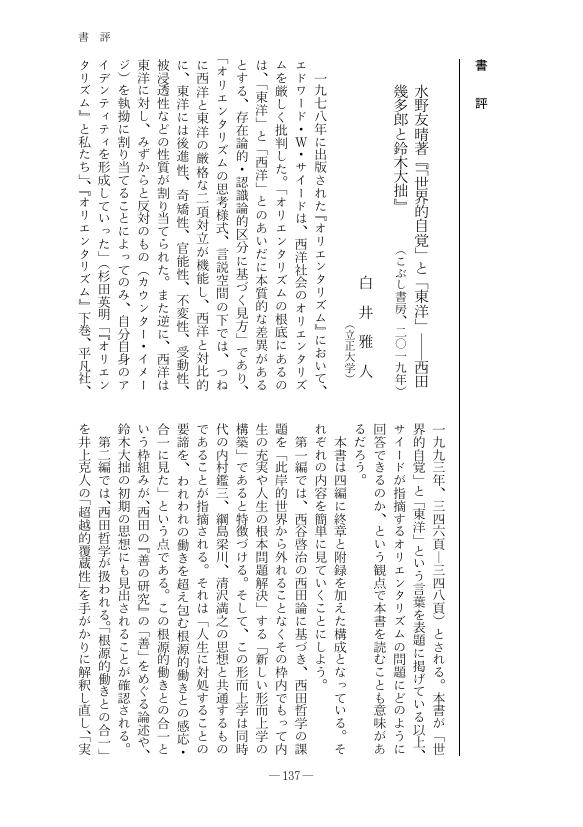- 著者
- 佐金 武
- 出版者
- The Philosophy of Science Society, Japan
- 雑誌
- 科学哲学 (ISSN:02893428)
- 巻号頁・発行日
- vol.53, no.2, pp.191-213, 2021-03-31 (Released:2021-03-31)
- 参考文献数
- 54
- 被引用文献数
- 1
The issue of (in)compatibility between presentism and time travel has intrigued many philosophers for the last few decades. Keller and Nelson [2001] have argued that, if presentism is a feasible theory of time that applies to ordinary (non-time travel) cases, then it should be compatible with time travel. Bigelow [2001] and Sider [2005], on the other hand, have independently argued that the idea of time travel contradicts the presentist conception of time because it involves the ʻspatialisation of timeʼ (in a metaphysical sense), which is something that presentists should resist. In support of the latter claim, I offer a new argument via a different route. More specifically, I clarify basic components of the view that I take as ʻorthodoxʼ presentism by examining how presentists have considered temporal notions of the existence of things and their property possession. It is because of these notions that presentists can sensibly maintain a dynamic theory of time and should not believe in time travel.
1 0 0 0 OA 深層学習の哲学的意義
- 著者
- 鈴木 貴之
- 出版者
- The Philosophy of Science Society, Japan
- 雑誌
- 科学哲学 (ISSN:02893428)
- 巻号頁・発行日
- vol.53, no.2, pp.151-167, 2021-03-31 (Released:2021-03-31)
- 参考文献数
- 24
Artificial intelligence research has made impressive progress in the last ten years with the development of new methodologies such as deep learning. There are several implications of the progress both for philosophy of cognitive science and philosophy of artificial intelligence, but none are conclusive. Though its success seems to support connectionism in cognitive science, there are several features of human cognition that remain to be explained. Also, though it is often said that deep learning is the key to build artificial general intelligence, deep neural networks we now have are specialized ones and it's not clear how we can build a general artificial intelligence from such specialized networks.
1 0 0 0 OA 特集テーマ「タイプ理論」について
- 著者
- 岡田 光弘
- 出版者
- The Philosophy of Science Society, Japan
- 雑誌
- 科学哲学 (ISSN:02893428)
- 巻号頁・発行日
- vol.53, no.2, pp.1, 2021-03-31 (Released:2021-03-31)
- 被引用文献数
- 1
1 0 0 0 OA 証明支援系と型理論
- 著者
- 佐藤 雅彦
- 出版者
- The Philosophy of Science Society, Japan
- 雑誌
- 科学哲学 (ISSN:02893428)
- 巻号頁・発行日
- vol.53, no.2, pp.3-23, 2021-03-31 (Released:2021-03-31)
- 参考文献数
- 35
In this paper, we analyze the historical process of emergence of proof assistants, and acceptance of proof assistants by the community of mathematicians. Our analysis is done by reflecting on how the notion of proof deepened through the proposal of formalism by Hilbert, formalization of the notion of computability, and especially development of type theory. In this analysis, we view mathematics as human linguistic activity where proofs are produced and communicated by means of both natural languages and formal languages. The complete acceptance of proof assistants by mathematicians is yet to be achieved, but we argue that it should and would happen by properly designing and implmenting a meta proof assistant which can talk and reason about any formal systems.
1 0 0 0 OA 行為理由はなんのために
- 著者
- 金子 裕介
- 出版者
- The Philosophy of Science Society, Japan
- 雑誌
- 科学哲学 (ISSN:02893428)
- 巻号頁・発行日
- vol.53, no.2, pp.215-238, 2021-03-31 (Released:2021-03-31)
- 参考文献数
- 34
This article handles a series of articles written by Suzuki (2016a; 2016b; 2018), in which he put forward the anti-psychologism, a new standpoint of action theory. This standpoint, however, has lost the path Anscombe originally opened up, seemingly. Anscombe's point (called “Anscombe's motif” in this article) was: the agent him/herself responds, by revealing his/her original motive, to the question “Why did/do you do…?” Leaving this ground, in modern theories, one sees an unfamiliar idea like a normative reason flow into the debate on human action. We review this academic environment critically in terms of Kaneko (2017), whom Suzuki criticized in one of his papers (2018).
1 0 0 0 OA 書評
1 0 0 0 OA 書評
1 0 0 0 OA 書評への応答
- 著者
- 高島 和哉
- 出版者
- 日本イギリス哲学会
- 雑誌
- イギリス哲学研究 (ISSN:03877450)
- 巻号頁・発行日
- vol.43, pp.109-110, 2020-03-20 (Released:2021-04-16)
1 0 0 0 OA 『年報第十六号』書評
- 著者
- 丹木 博一
- 出版者
- 西田哲学会
- 雑誌
- 西田哲学会年報 (ISSN:21881995)
- 巻号頁・発行日
- vol.17, pp.145-149, 2020 (Released:2022-03-11)
1 0 0 0 OA 書評 水野友晴著『「世界的自覚」と「東洋」―西田幾多郎と鈴木大拙』
- 著者
- 白井 雅人
- 出版者
- 西田哲学会
- 雑誌
- 西田哲学会年報 (ISSN:21881995)
- 巻号頁・発行日
- vol.17, pp.137-140, 2020 (Released:2022-03-11)
1 0 0 0 OA 書評 永井均著 『時計、貨幣、言語―西田幾多郎の成立の謎へ』
- 著者
- 張 政遠
- 出版者
- 西田哲学会
- 雑誌
- 西田哲学会年報 (ISSN:21881995)
- 巻号頁・発行日
- vol.17, pp.141-144, 2020 (Released:2022-03-11)
1 0 0 0 OA 書評
1 0 0 0 OA 書評
1 0 0 0 OA 書評
- 著者
- 松王 政浩
- 出版者
- The Philosophy of Science Society, Japan
- 雑誌
- 科学哲学 (ISSN:02893428)
- 巻号頁・発行日
- vol.51, no.1, pp.79-83, 2018-07-31 (Released:2019-05-02)
1 0 0 0 OA 書評
- 著者
- 鈴木 真 佐金 武 田中 泉吏 網谷 祐一
- 出版者
- The Philosophy of Science Society, Japan
- 雑誌
- 科学哲学 (ISSN:02893428)
- 巻号頁・発行日
- vol.50, pp.129-143, 2017-12-20 (Released:2019-05-02)
1 0 0 0 OA 書評への応答
- 著者
- 神山 和好 山田 園子
- 出版者
- 日本イギリス哲学会
- 雑誌
- イギリス哲学研究 (ISSN:03877450)
- 巻号頁・発行日
- vol.40, pp.96-97, 2017-03-20 (Released:2018-07-25)
1 0 0 0 OA 書評
1 0 0 0 OA 書評
- 著者
- 倉田 剛 小口 峰樹 網谷 祐一 野内 玲
- 出版者
- The Philosophy of Science Society, Japan
- 雑誌
- 科学哲学 (ISSN:02893428)
- 巻号頁・発行日
- vol.49, no.1, pp.91-104, 2016-07-31 (Released:2016-11-10)















